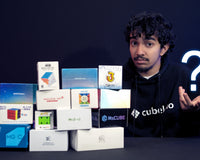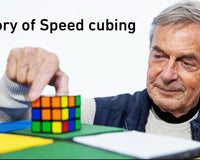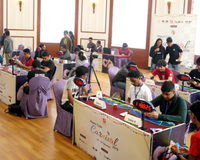The Rubik’s cube was invented by Erno Rubik, a Hungarian professor in 1974. Cubing has existed for over 4 decades and has been growing for a while now. There has been a surge in participation that we had in recent years before the pandemic hit and shut down the entire world. The speedcubing sport is a physical sport as we need fine motor skills, hand eye coordination, reflexes, intuition, muscle memory and a lot of finer physical aspects in order to solve cubes faster. A lot of biomechanics goes if we try to analyze a really fast solution and analyze how the turning was executed and the high turn speed on the cube was generated. Nowadays, 3x3 cube solves go upto 10-12 turns per second which make this sport a high precision sport and improving in it a big grind.
Cubing was primarily considered an intellectual activity by society and popular media all over the world, thanks to the weird marketing of Erno Rubik in the 1980s. Cubing has evolved into something different now. It is more like Formula 1 racing, with all the top solvers using highly optimized solving styles and winning by tenth of a second. One prime example is the Worlds 2019 3x3 finals where the podium has super tiny variance. The first 5 places were within 0.10 seconds off the average of 5 which is super tight competition. In this article, we dive into the question of recognizing cubing as a sport and potential addition of it to the Olympics.

How can we get there?
First, we have basic prerequisites of the cubing sport in order. We all agree that the spirit of speedcubing competitions maintained by the WCA is well and good, but it does not make it a clear candidate as a major sport and as an Olympic sport candidate. There are a lot of things that go before we get to present before the International Olympic Committee. According to the Olympic rulebook, a sport must be widely practiced by men in at least 75 countries and on four continents and by women in no fewer than 40 countries and on three continents.
Cubing as a Sport
Currently, speedcubing is prevalent in 100+ countries and we do not have full time delegates in 100+ countries. The first thing to start with is to have delegates reach out to all parts of the world and make reliable organization teams and venues. There are world championships held regularly every two years and continental championships held every two years. There are 17 categories that primarily assess the speed of the competitors.
The events MBLD and FMC assess the efficiency and speed of the competitor. Cubing is perceived as a mental sport, but it is quite physical. It requires a lot of hand-eye coordination, muscle memory and fine tuned motor skills. Most of the top solvers have good wrist flexibility in order to turn the cube at speeds of 10+ turns per second and solve it.
Is the Cubing Olympic Proposal good enough as of 2022?

Cubing competitions have existed in the WCA since 1982, but competitions only picked up after the 2003 World Championship. In fact, we can say cubing really took off when the frequency of competitions increased, which was a couple of years later.
Cubing Outreach
Outreach is a big part of getting recognition. Many sports put a massive effort in order to grow their reach among the world audience. The strongest way of doing outreach is to target schools and the young population and build a strong presence among young populations to take up this activity. A lot of investment, manpower and planning is required in order to get effective outreach and basically work on the grassroots of the sport. Media and public interest is one of the key areas to target to make cubing huge. Redbull competitions are trying to address this and I discuss this more in my next article which focuses on the activities of the Redbull company.
The Growth, The Money and The Governing Bodies
WCA is a volunteer based organization. The WFC(WCA Finance Committee) has stated in the past 2 years that we do not have that much money to spend on making the sport big. The current cash flow is in the order of thousands of dollars which is not good enough for a headstart in say, marketing the WCA organization and reaching out to all potential countries and sports governing bodies. A lot of growth and sponsorship is required to get cubing big and impactful. Every single local competition need not reap massive sponsorships, but we at least need the competition at the biggest stage, the World Championship, to have sponsors with deep pockets.
Explore 5x5 Cubes
Conclusion
“A journey of a thousand miles begins with a single step”
There is still a lot of time for cubing to reach that level before it is a potential candidate for the Olympics. It is a relatively new sport with most of the demographic being teenagers, freelancers and highly motivated 10 year olds. We have a long way to go before the Olympic dream comes true. Till then we have to pitch in and make our individual efforts count and make steady progress and grow the speedcubing spirit and competitions. Every enthusiastic person has to pitch in with new ideas and activities to make cubing bigger and have a wider reach. Finally, before signing off from this article, I want each one of the readers to make a prediction about their estimate for cubing to reach the Olympics and comment on the year in the comment section below.
Happy Cubing!
About Author

Abhijeet Ghodgaonkar
Abhijeet Ghodgaonkar is the current 4x4 Blindfold (single) National Record holder from Mumbai. He started cubing when he was 13 and he has an overall competitive experience of 8 years. His main events are 5BLD and MBLD. He has been developing concepts like letter quads and 5-style since 2017, to make blind-solving events more structured. He has participated in 50 competitions in a total of 3 countries and won 105 podiums with 51 Gold medals, 2 Asian Continental Records, and 3 National Records. He also has a World Ranking of 29 in 4x4 Blindfolded Single.

































1 comment
Ismatillo
I like rubik’s cube